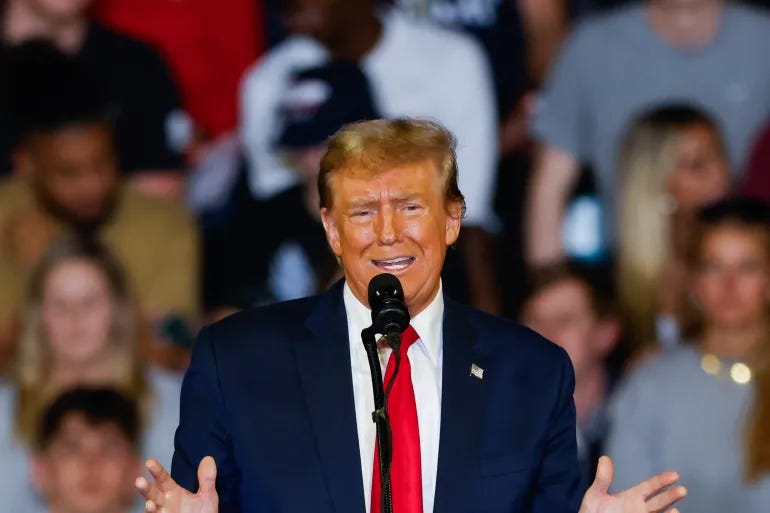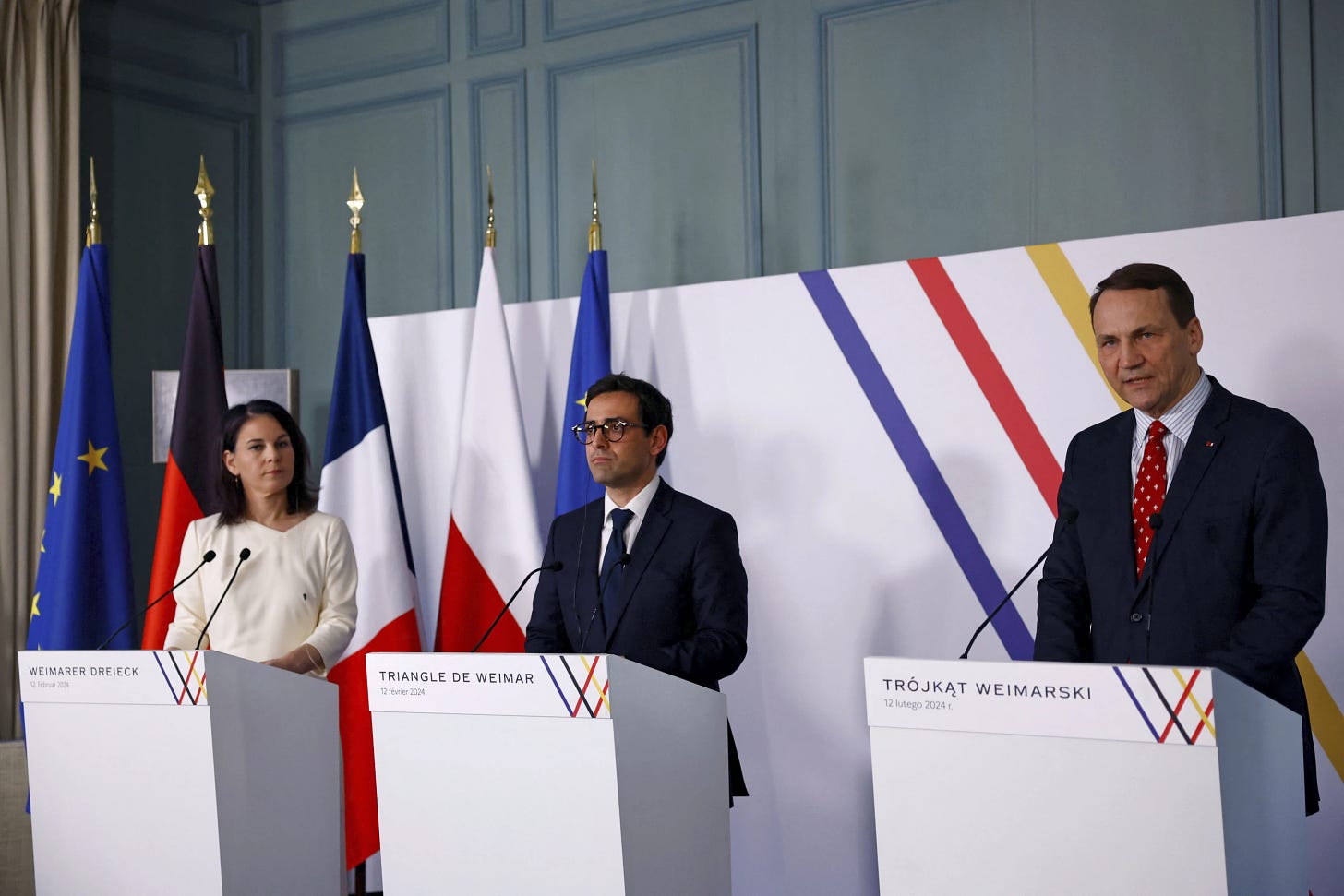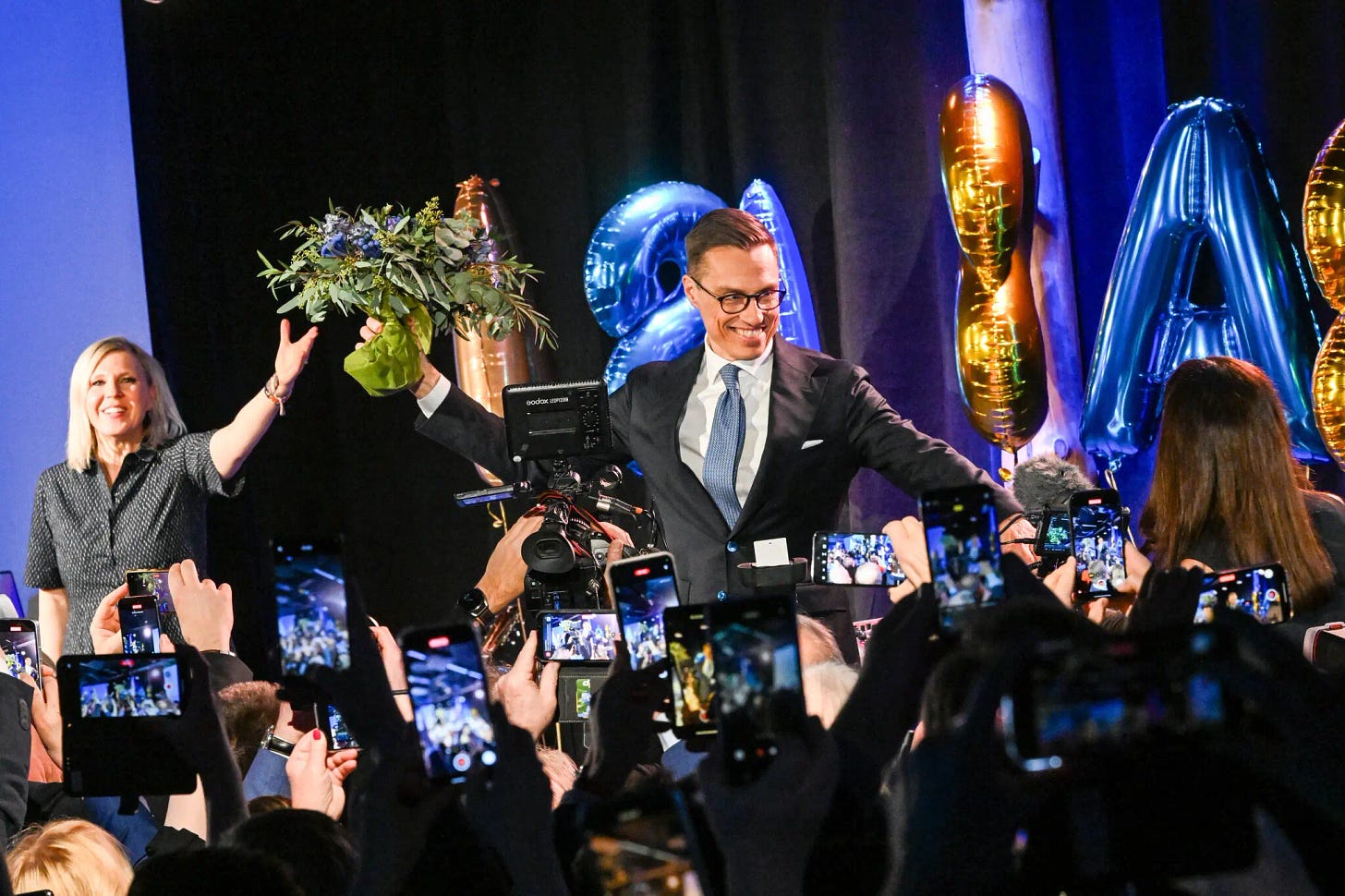UPDATES: The governments of Poland, France and Germany vowed Monday to make Europe a security and defense power with a greater ability to back Ukraine, amid concerns that former U.S. President Donald Trump might return to the White House and allow Russia to expand its aggression on the continent.
The newly elected president of Finland, Alexander Stubb, was expected to strengthen the country's ties with the United States and NATO. However, his inauguration comes at a time of uncertainty due to comments from former U.S. President Donald Trump, who threatened to limit support for NATO allies. Despite this, Stubb remains composed and emphasizes the need for European nations to take responsibility for their defense, rather than relying solely on the U.S.
By 2022, the number of NATO nations spending at least 2 percent of their GDP to defense had reached eight — the US, UK, Greece, Poland, Latvia, Lithuania, Estonia and Croatia. Then, as the war in Ukraine continued and fears over Russia’s expansionist ambitions mounted, more European members increased their military budgets. The number rose to 11 in 2023 with Hungary, Romania, Slovakia and new NATO entrant Finland all spending more than 2 percent while Croatia tipped under the threshold.
Former US President and 2024 presidential hopeful Donald Trump says he would not defend 'delinquent' NATO members during a campaign rally in Conway, South Carolina, on February 10, 2024 [Julia Nikhinson/AFP] (Taken form Aljazeera)
French Foreign and European Affairs Minister Stephane Sejourne, center, German Foreign Minister Annalena Baerbock, left, and Polish Foreign Minister Radoslaw Sikorski attend a press conference after the Weimar Triangle talks at the Chateau de La Celle Saint-Cloud near Paris, Monday, Feb. 12, 2024. (Taken From AP)
Poland, France and Germany vow to make Europe stronger as fears grow over Russia and Trump
BY SYLVIE CORBET, VANESSA GERA AND GEIR MOULSON
The governments of Poland, France and Germany vowed Monday to make Europe a security and defense power with a greater ability to back Ukraine, amid concerns that former U.S. President Donald Trump might return to the White House and allow Russia to expand its aggression on the continent.
The foreign ministers of the three countries met in the Paris suburb of La Celle-Saint-Cloud to have talks about Ukraine, amid other issues. They discussed reviving the so-called Weimar Triangle, a long dormant regional grouping that was designed to promote cooperation between France, Germany and Poland.
Polish Prime Minister Donald Tusk, who met with French President Emmanuel Macron in Paris and German Chancellor Olaf Scholz in Berlin on Monday, said he wanted to “revitalize” his nation’s relations with its key European partners.
“There is no reason why we should be so clearly militarily weaker than Russia, and therefore increasing production and intensifying our cooperation are absolutely indisputable priorities,” Tusk said in arguing for the European Union to become “a military power” in its own right.
The diplomatic push came after Trump shocked many in Europe over the weekend by appearing to invite Russia to invade any NATO member not spending enough on its own defense.
“‘You didn’t pay? You’re delinquent?’” Trump recounted telling an unidentified NATO member during his presidency. “‘No, I would not protect you. In fact, I would encourage them to do whatever the hell they want. You gotta pay. You gotta pay your bills.’”
The Republican front-runner’s words at a campaign rally were particularly shocking for front-line NATO countries like Poland, which experienced both German and Soviet occupation during World War II and later spent decades under Soviet control. Anxieties run high there over the ongoing war just across Poland’s eastern border.
Speaking alongside Tusk in Berlin, Scholz blasted Trump’s comments
“NATO’s promise of protection is unrestricted -- ‘all for one and one for all,’” Scholz said without mentioning the former president by name. “And let me say clearly for current reasons: Any relativization of NATO’s support guarantee is irresponsible and dangerous, and is in the interest of Russia alone.”
“No one can play, or ‘deal,’ with Europe’s security,” the chancellor added.
Earlier Monday, Scholz inaugurated a new ammunition factory, underlining Europe’s efforts to ramp up weapons production.
Tusk also urged European nations to invest more in military projects in order “to achieve as quickly as possible... in the next dozen or so months, much greater air defense capabilities, much greater production capabilities in terms of ammunition.”
Asked about Trump’s remarks, Tusk said they “should act like a cold shower for all those who continue to underestimate this increasingly real threat which Europe is facing.”
Macron, speaking alongside Tusk in Paris, said Europe’s will “to further supply and meet Ukrainian needs is crucial,” after leaders of the 27 EU member nations sealed a deal to provide Ukraine with 50 billion euros ($54 billion) in support for its war-ravaged economy.
This “will enable us to make from Europe a security and defense power that is both complementary to NATO and a pillar of the Atlantic alliance, Macron said.
Trump’s remarks raised concerns that if reelected, he could embolden Russia to attack other countries besides Ukraine. NATO Secretary-General Jens Stoltenberg issued a statement Sunday saying that Trump’s remarks put American troops and their allies at greater risk.
NATO does not require its 31 members to pay bills, but they are expected to invest a certain percentage of their own budgets — ideally, 2% of their gross domestic product — on defense.
Some countries, like Poland, have long met the target. Other European nations ramped up their military spending after Russia invaded Ukraine almost two years ago.
Speaking in Rome, Italian Foreign Minister Antonio Tajani dismissed Trump’s threat as “electoral campaign joke,” but said it was legitimate for all NATO members to do their part. Italy hasn’t yet reached the 2% GDP defense spending target.
“To have more influence within NATO we need a Europe with its own army,” he said. “We must look forward, because it is fair that Americans are asking us to do our part, we must have equal responsibility.”
Germany, with a post-World War II political culture of military caution, was a frequent target of Trump’s ire during his presidency for falling short of the 2% target, But Berlin announced plans to step up military spending after the full-scale invasion of Ukraine and plans to hit the benchmark this year.
France’s military budget grew in recent years and reached the level of about 2% of GDP.
Tusk returned to power as prime minister of his central European nation in December after eight years of rule by a national conservative government that often took an antagonistic stance with European allies, particularly Germany. As a result, Warsaw’s influence in Europe diminished.
Read more
Alexander Stubb in Helsinki, Finland, on Sunday, after winning the second round of the presidential election.Credit...Kimmo Brandt/EPA, via Shutterstock (Taken From The New York Times)
Finland’s New President Faces Unexpected First Test: Not Russia, but Trump
By Johanna Lemola and Erika Solomon
Educated in the United States and deeply pro-American, Finland’s president-elect, Alexander Stubb, looked perfectly poised to lead his nation into a stronger trans-Atlantic partnership and redefine its role in the global order as a newly minted NATO member.
Instead, he will enter office next month at a time when U.S. politics has once again thrown the durability of that relationship — and the wisdom of European nations counting on it — into question.
For weeks, the two candidates in Finland’s runoff presidential elections, which Mr. Stubb won on Sunday, had played up their pro-NATO credentials and tough views on Russia. Then the former U.S. president Donald J. Trump threatened that, if re-elected, he would let Russia “do whatever the hell they want” against NATO allies that do not contribute sufficiently to collective defense.
That is hardly what this tiny Nordic nation of 5.6 million, after decades maintaining a policy of nonalignment, wants to hear, now that it holds NATO’s longest border with Russia — and as European leaders warn that the continent’s confrontation with Moscow may drag on for decades.
Mr. Trump’s comments have been a harsh reminder to many European nations that banking on Washington in the face of Russia’s invasion of Ukraine is no longer as sure a bet as it seemed.
In a statement on Sunday, Jens Stoltenberg, NATO’s secretary general, said “Any suggestion that allies will not defend each other undermines all of our security, including that of the U.S., and puts American and European soldiers at increased risk.”
Yet in Helsinki, the newly elected Mr. Stubb kept his cool.
In some of his first comments since winning the election Sunday night, he chalked up Mr. Trump’s words to a difference between fiery American campaign rhetoric and the consensus-driven views of Finnish presidential campaigns.
“This is because, to us, foreign policy is an existential question,” he told a news conference on Monday.
Instead he urged Finns to take the unsettling comments as yet another reminder that Europe, now facing its largest land war since World War II, needs to take seriously its own defense, without counting on Washington, regardless of who ends up in the Oval Office.
Calling himself an “avid trans-Atlanticist,” who believed U.S. engagement in NATO was critical, Mr. Stubb said he nonetheless believed Europe needed to rely more on itself.
“The whole European security order has been upended because of Russian aggression and its attack on Ukraine,” he said. “We need to make sure that we in Europe take care of our own part in NATO. Finland is a country that will continue to do that. We are a security provider, not a security consumer.”
Finland has an extended history of war with its larger eastern neighbor — Finns coined the term “Molotov cocktail” during their 1939 Winter War with Russia. Living in Russia’s shadow, Finland has long had a conscription army and already spends on its defense more than the 2 percent of G.D.P. that NATO members pledge to spend.
Mr. Stubb, switching between fluent Finnish, Swedish and English in his news conference, even argued that Mr. Trump was “basically right” that countries were obligated to meet spending commitments.
Read more
Trump’s Russia threat against NATO: What US allies are spending on defence
By Aljazeera
Former United States President Donald Trump has stirred strong reactions in Europe after saying Washington might not protect NATO allies from potential attack from Russia if he wins the November election unless some members of the alliance step up their military spending.
Speaking at a campaign rally on Saturday in South Carolina, the Republican Party’s presidential frontrunner said he told an unnamed leader of a “big country” that is part of NATO that he would “encourage them [Russia] to do whatever the hell they want” with nations that don’t spend sufficiently on defence.
NATO, which was formed during the Cold War, consists of 31 nations, all of them in Europe except for the US and Canada. Under Article 5 of the treaty that created the North Atlantic Treaty Organization, an attack on one member prompts a response from all.
Trump has made similar comments about military spending by other NATO members previously, including when he was president, saying the US unfairly shoulders the alliance’s defence burden.
But while the real estate developer-turned-politician’s rhetoric about the alliance remains unchanged, the spending by NATO members is different from what they were when Trump was in office.
A key reason: Russia’s war on Ukraine and the increased threat perception in Europe.
How much are NATO members spending on defence?
NATO defence spending declined sharply after the Cold War – from 4.1 percent of combined gross domestic product (GDP) in 1990 to 2.6 percent in 2000 – even as the group expanded. To boost funding, members agreed at a 2014 summit in Wales to contribute at least 2 percent of their GDPs to the alliance by 2024.
By 2017, when Trump was sworn in as US president, only four countries met that threshold: the US, Greece, the United Kingdom and Poland. Trump’s argument since then has been that the US needs to pressure allies to expand their military budgets.
Seven years later, NATO military spending has changed significantly, even though most members still do not commit 2 percent of their GDPs to defence.
By 2022, the number of NATO nations meeting that bar had reached eight — the US, UK, Greece, Poland, Latvia, Lithuania, Estonia and Croatia.
Then, as the war in Ukraine continued and fears over Russia’s expansionist ambitions mounted, more European members increased their military budgets. The number rose to 11 in 2023 with Hungary, Romania, Slovakia and new NATO entrant Finland all spending more than 2 percent while Croatia tipped under the threshold.
Luxembourg (0.7 percent) spends the least in relation to its GDP. Belgium (1.1 percent), Turkey (1.3 percent), Spain (1.3 percent), Slovenia (1.4 percent) and Canada (1.4 percent) are other member nations at the bottom of the spending pile.
Yet even as more NATO members have increased their spending, the alliance’s dependence on the size and strength of the US military has only grown.
The US, whose military forms the core of the alliance, has consistently spent more than all other members combined. In 1990, the US accounted for 61 percent of the alliance’s defence spending. By 2020, the US share had increased to 70 percent.
How has the Ukraine war affected NATO spending?
Several NATO members announced intentions to increase their defence budgets and meet the 2 percent target after Russia’s invasion of Ukraine. France promised to meet the threshold in 2025, Italy in 2028, Spain in 2029 and Belgium in 2035.
In December, the alliance announced a 2.03-billion-euro ($2.4bn) military budget for 2024, a 12 percent increase from 2023.
According to the White House, the US has provided wartime Ukraine with more financial aid than any other country, amounting to $44bn since 2022.
Experts said NATO is still falling short of its target on individual member’s military spending and the budgets of Western European countries farther away from Russia, like Germany, have been some of the slowest to rise.
From 2021 to 2023, Berlin increased its spending as a percentage of GDP by 0.1 percent. Ukraine’s neighbour Poland, on the other hand, has almost doubled its spending during that time.
Read more





